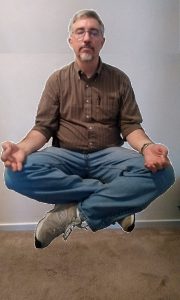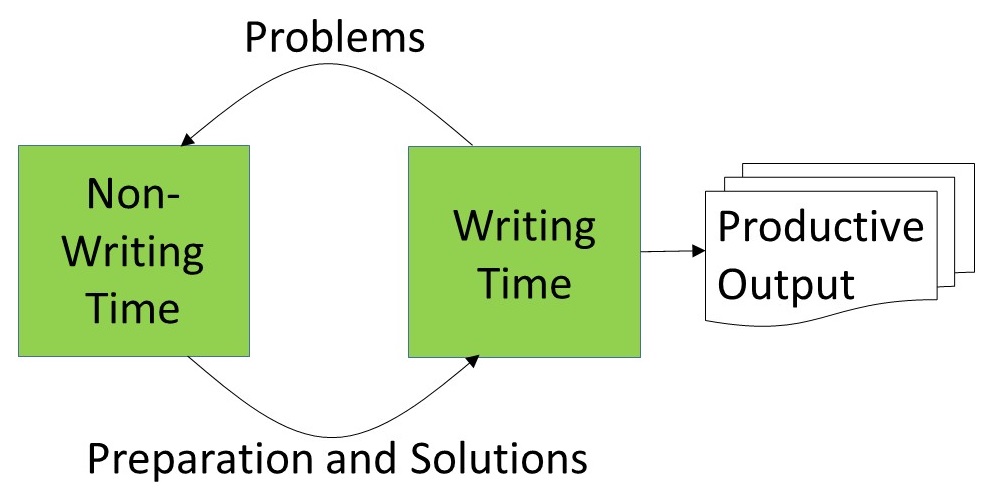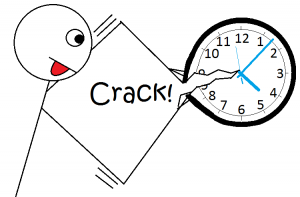This post’s title sounds kind of Zen, doesn’t it? What does it mean to write when you’re not writing?
 Let’s say you’d like to be a writer, or a more prolific writer. The trouble is time. There’s not enough of it in your day. The rest of life sucks up too much time. Just when you find yourself with a few free minutes to write, the words won’t flow, or you’re too exhausted.
Let’s say you’d like to be a writer, or a more prolific writer. The trouble is time. There’s not enough of it in your day. The rest of life sucks up too much time. Just when you find yourself with a few free minutes to write, the words won’t flow, or you’re too exhausted.
What if you could get some writing done during the rest of the day when you’re not writing? Moreover, what if I told you that if you could write when you’re not writing, you’ll write more and better prose when you do write? Is that even possible?
It is possible. I’ve hinted about it in previous posts, but today I’ll describe what I mean. First, I’ll discuss the available time, and then I’ll go into what you can do with that time.
List the activities you do during a typical week or month that have the following properties: (1) you are either alone or don’t have to interact with others, (2) you are performing drone work that doesn’t require full concentration, or you’re waiting for something to happen.
Examples of these activities might include:
- Cleaning your place;
- Commuting to and from work;
- Waiting in a doctor’s or dentist’s waiting room;
- Showering or bathing;
- Preparing or eating a meal alone, and cleaning up afterward;
- Sitting (ahem) atop a porcelain throne in the bathroom;
- Yard work or gardening;
- Exercising;
- Waiting to fall asleep;
- Etc.
Your list would be different, but you get the idea. That represents an amount of time when you’re awake and alert, but may not need to focus all your attention on your activity. (Be careful with the commuting one, though; that works best if you ride in a vehicle someone else is driving.)
That’s the time you have available to write when you’re not writing. What kind of writing can you do during that time? Especially if you can’t actually write anything down?
Here are some examples:
- Think of your next story idea;
- Flesh out a character, including her specifics like strengths, weaknesses, personality, quirks, motivations, life story, etc.;
- Imagine the details of a scene’s setting;
- Work out a solution to a plot problem;
- Do some people-watching, for appearance quirks, gestures, and speech patterns you can use for your characters;
- Lay out how the next scene will go, including dialogue and action;
- Etc.
This list will vary quite a bit, not just between different writers, but it will vary for you, day to day. These are the things you will think about during the times you’re not writing. Sometimes the process may be almost, or entirely, subconscious. You emerge with the problem solved in your mind even though you’d don’t recall thinking about it.
Oh, yeah. Remember I mentioned that writing when you aren’t writing will help you be more productive when you are writing? Here’s how that works. Since you solved some problems when you weren’t writing, you’ll sit down at the keyboard and you’ll know what to do right away. No need to ponder things. Those ideas you had will spill out.
Some ideas won’t look as good when you write them down as they did in your mind while you were showering. That’s okay; you can always modify and improve them.
 By the way, this process of having your non-writing time influence your writing time—it also works the other way around, too. When you’re writing and you come across a problem, relax. You don’t have to solve it right away. Just file it away for future thought. That’s what your non-writing time is for. Simply move on. In this manner, your writing time also serves to prime the pump with problems to work on in your non-writing time.
By the way, this process of having your non-writing time influence your writing time—it also works the other way around, too. When you’re writing and you come across a problem, relax. You don’t have to solve it right away. Just file it away for future thought. That’s what your non-writing time is for. Simply move on. In this manner, your writing time also serves to prime the pump with problems to work on in your non-writing time.
Practice writing when not writing, my diligent apprentice, and you, too, will attain the skills of Zen Master—
Poseidon’s Scribe

 Sure, you say, but those great authors don’t do anything but write. Writing is their day job. That may be true for many of the great authors, but few of them started great. Most had day jobs until their books sold well.
Sure, you say, but those great authors don’t do anything but write. Writing is their day job. That may be true for many of the great authors, but few of them started great. Most had day jobs until their books sold well.